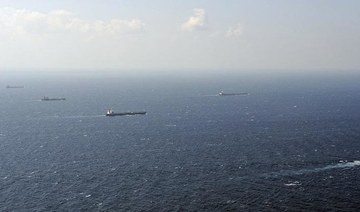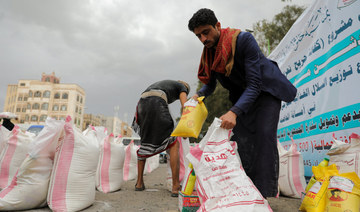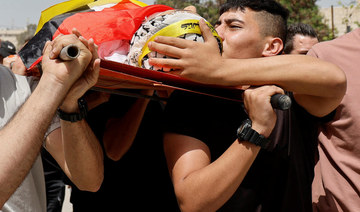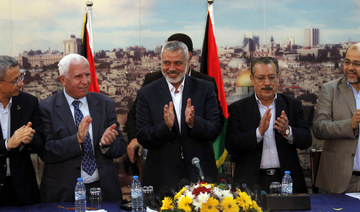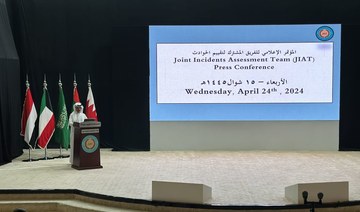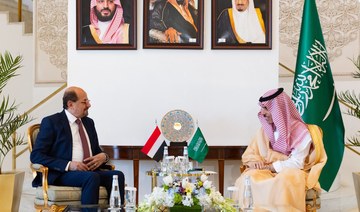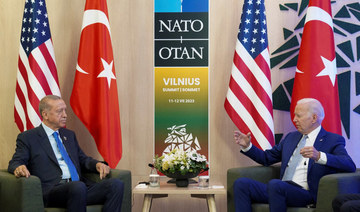DUBAI, UAE: Yemen’s Houthis claim to have a new, hypersonic missile in their arsenal, Russia’s state media reported Thursday, potentially raising the stakes in their attacks on shipping in the Red Sea and surrounding waterways against the backdrop of Israel’s war with Hamas in the Gaza Strip.
The report by the state-run RIA Novosti news agency cited an unidentified official but provided no evidence for the claim. It comes as Moscow maintains an aggressively counter-Western foreign policy amid its grinding war on Ukraine.
However, the Houthis have for weeks hinted about “surprises” they plan for the battles at sea to counter the United States and its allies, which have so far been able to down any missile or bomb-carrying drone that comes near their warships in Mideast waters.
On Thursday, Abdul Malik Al-Houthi, the Houthis’ secretive supreme leader, said the militia will start hitting ships heading toward the Cape of Good Hope in Africa’s southern tip. Until now, the militia has largely struck ships heading into the Red Sea toward the Suez Canal, and such an escalation would target the longer, alternative route used by some vessels. It remains unclear how they would carry any possible assault out.
Meanwhile, Iran and the US reportedly held indirect talks in Oman, the first in months amid their long-simmering tensions over Tehran’s rapidly advancing nuclear program and attacks by its proxies.
Iran, the Houthis’ main benefactor, claims to have a hypersonic missile and has widely armed the militia with the missiles it now uses. Adding a hypersonic missile to their arsenal could pose a more formidable challenge to the air defense systems employed by America and its allies, including Israel.
“The group’s missile forces have successfully tested a missile that is capable of reaching speeds of up to Mach 8 and runs on solid fuel,” a military official close to the Houthis said, according to the RIA report. The Houthis “intend to begin manufacturing it for use during attacks in the Red Sea and the Gulf of Aden, as well as against targets in Israel.”
Mach 8 is eight times the speed of sound.
Hypersonic weapons, which fly at speeds higher than Mach 5, could pose crucial challenges to missile defense systems because of their speed and maneuverability.
Ballistic missiles fly on a trajectory in which anti-missile systems like the US-made Patriot can anticipate their path and intercept them. The more irregular the missile’s flight path, such as a hypersonic missile with the ability to change directions, the more difficult it becomes to intercept.
China is believed to be pursuing the weapons, as is America. Russia claims it has already used them.
In Yemen, Abdul Malik Al-Houthi boasted that his fighters “continue to expand the effectiveness and scope of our operations to areas and locations the enemy never expects.” He said they would prevent ships “connected to the Israeli enemy even crossing the Indian Ocean ... heading toward the Cape of Good Hope.”
The Houthis have attacked ships since November, saying they want to force Israel to end its offensive in Gaza, launched in response to Hamas’ Oct. 7 attack on southern Israel. The ships targeted by the Houthis, however, have increasingly had little or no connection to Israel, the US or other nations involved in the war. The militia has also fired missiles toward Israel, though they have largely fallen short or been intercepted.
The Houthis don’t have a navy, nor weapons reaching into the far distances of the Indian Ocean, making their Cape of Good Hope threat difficult. However, Iran is suspected of targeting Israeli-linked vessels previously in the Indian Ocean. The Houthis have claimed attacks assessed to have been carried out by Iran in the past, such as the 2019 attack on Saudi Arabia that temporarily halved its oil production.
After seizing Yemen’s capital, Sanaa, in 2014, the Houthis ransacked government arsenals, which held Soviet-era Scud missiles and other arms.
As the Saudi-led coalition entered Yemen’s conflict on behalf of its exiled government in 2015, the Houthis’ arsenal was increasingly targeted. Soon — and despite Yemen having no indigenous missile manufacturing infrastructure — newer missiles made their way into militia’s hands.
Iran long has denied arming the Houthis, likely because of a yearslong United Nations arms embargo on the militia. However, the US and its allies have seized multiple arms shipments bound for the rebels in Mideast waters. Weapons experts as well have tied Houthi arms seized on the battlefield back to Iran.
Iran also now claims to have a hypersonic weapon. In June, Iran unveiled its Fattah, or “Conqueror” in Farsi, missile, which it described as being a hypersonic. It described another as being in development.
Iran’s mission to the UN did not respond to a request for comment Thursday. Asked about the hypersonic claim, Pentagon spokesperson Sabrina Singh said: “We have no indication that they even have that capability.”
Israel’s military declined to comment.
Also Thursday, The Financial Times reported that the US and Iran held indirect talks in Oman in January that America hoped would curtail the Red Sea attacks. The last known round of such talks had come last May.
Iran’s state-run IRNA news agency indirectly acknowledged the talks but insisted they were “merely limited to negotiations on lifting anti-Iran sanctions.”
The US State Department did not deny the January talks took place in a statement to The Associated Press, saying: “We have many channels for passing messages to Iran.”
“Since Oct. 7, all of (the communications) have been focused on raising the full range of threats emanating from Iran and the need for Iran to cease its across-the-board escalation,” it added.
The assaults on shipping have raised the profile of the Houthis, whose Zaydi people ruled a 1,000-year kingdom in Yemen up until 1962. Adding a new weapon increases that cachet and puts more pressure on Israel after a ceasefire deal failed to take hold in Gaza before the Muslim holy month of Ramadan.
Earlier in March, a Houthi missile struck a commercial ship in the Gulf of Aden, killing three of its crew members and forcing survivors to abandon the vessel. It marked the first fatal attack by the Houthis on shipping.
Other recent Houthi actions include an attack last month on a cargo ship carrying fertilizer, the Rubymar, which later sank after drifting for several days.
A new suspected Houthi attack targeted a ship in the Gulf of Aden on Thursday, but missed the vessel and caused no damage, the British military’s United Kingdom Maritime Trade Operations center said. A later attack similarly missed a vessel in the Red Sea off Yemen’s port city of Hodeida, the center said early Friday.
Fabian Hinz, a missile expert and research fellow at the International Institute for Strategic Studies, said he wouldn’t be surprised if Iran transferred a new, hypersonic weapon to the Houthis. However, the question is how maneuverable such a weapon would be at hypersonic speeds and whether it could hit moving targets, like ships in the Red Sea.
“I wouldn’t exclude the possibility that the Houthis have some system that has some maneuvering capability to some extent,” Hinz said. “It is also possible for the Iranians to transfer new stuff for the Houthis to test it.”
Yemen’s Houthis reported to have a hypersonic missile, possibly raising stakes in Red Sea crisis
https://arab.news/r3ra2
Yemen’s Houthis reported to have a hypersonic missile, possibly raising stakes in Red Sea crisis
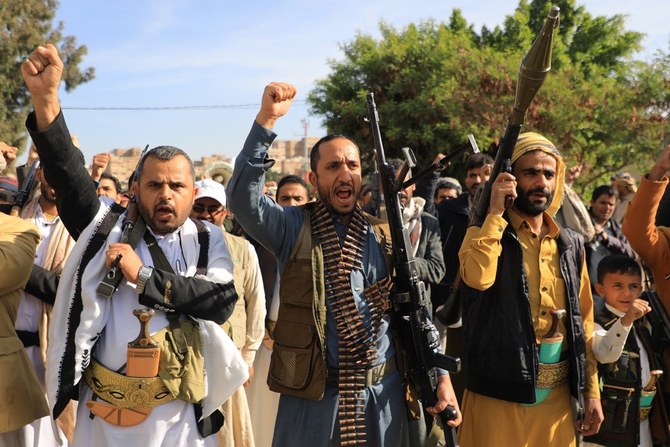
- Abdul Malik Al-Houthi said the militia will start hitting ships heading toward the Cape of Good Hope in Africa’s southern tip
Israeli soldiers kill two Palestinian gunmen in West Bank, military says
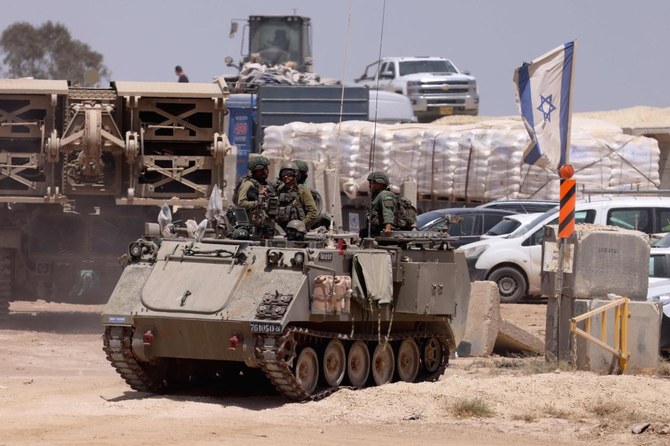
- Violence has been on the rise as Israel presses its attacks and bombardment in Gaza
RAMALLAH, West Bank: Israeli soldiers killed two Palestinian gunmen who opened fire at them from a vehicle in the occupied West Bank, the military said on Saturday.
The military released a photo of two automatic rifles that it said were used by several gunmen to shoot at the soldiers, at an outpost near the flashpoint Palestinian city of Jenin.
The official Palestinian news agency Wafa said security officials confirmed two deaths and the health ministry said two other men were wounded.
There was no other immediate comment from Palestinian officials in the West Bank, where violence has been on the rise as Israel presses its war against Palestinian militant group Hamas in Gaza.
Israel launched its offensive in Gaza after Hamas led an attack on southern Israel on Oct. 7 in which 1,200 people were killed and 253 taken hostage. More than 34,000 Palestinians have since been killed and most of the population displaced.
Violence in the West Bank, which had already been on the rise before the war, has since flared with stepped up Israeli raids and Palestinian street attacks.
The West Bank and Gaza, territories Israel captured in the 1967 war, are among the territories which the Palestinians seek for a state. US-brokered peace talks collapsed a decade ago.
Hamas says it received Israel’s response to its ceasefire proposal
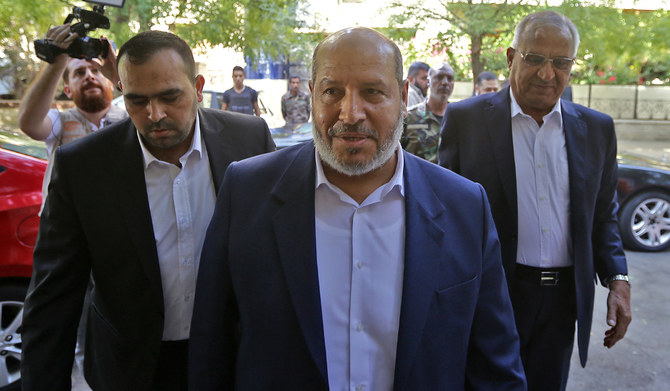
- White House national security adviser Jake Sullivan said on Friday he saw fresh momentum in talks to end the war and return the remaining hostages
- Israel has killed more than 34,000 Palestinians in Gaza, mostly women and children, according to the health ministry in the Hamas-run territory
CAIRO: Hamas said it had received on Saturday Israel’s official response to its latest ceasefire proposal and will study it before submitting its reply, the group’s deputy Gaza chief said in a statement.
“Hamas has received today the official response of the Zionist occupation to the proposal presented to the Egyptian and the Qatari mediators on April 13,” Khalil Al-Hayya, who is currently based in Qatar, said in a statement published by the group.
After more than six months of war with Israel in Gaza, the negotiations remain deadlocked, with Hamas sticking to its demands that any agreement must end the war.
An Egyptian delegation visited Israel for discussion with Israeli officials on Friday, looking for a way to restart talks to end the conflict and return remaining hostages taken when Hamas fighters stormed into Israeli towns on Oct. 7, an official briefed on the meetings said.
The official, who spoke on condition of anonymity, said Israel had no new proposals to make, although it was willing to consider a limited truce in which 33 hostages would be released by Hamas, instead of the 40 previously under discussion.
On Thursday, the United States and 17 other countries appealed to Hamas to release all of its hostages as a pathway to end the crisis.
Hamas has vowed not to relent to international pressure but in a statement it issued on Friday it said it was “open to any ideas or proposals that take into account the needs and rights of our people.”
However, it stuck to its key demands that Israel has rejected, and criticized the joint statement issued by the USand others for not calling for a permanent ceasefire and the withdrawal of Israeli forces from Gaza.
White House national security adviser Jake Sullivan said on Friday he saw fresh momentum in talks to end the war and return the remaining hostages.
Citing two Israeli officials, Axios reported that Israel told the Egyptian mediators on Friday that it was ready to give hostage negotiations “one last chance” to reach a deal with Hamas before moving forward with an invasion of Rafah, the last refuge for around a million Palestinians who fled Israeli forces further north in Gaza earlier in the war.
Meanwhile, in Rafah, Palestinian health officials said an Israeli air strike on a house killed at least five people and wounded others.
Hamas fighters stormed into Israeli towns on Oct. 7, killing 1,200 people and capturing 253 hostages. Israel has sworn to annihilate Hamas in an onslaught that has killed more than 34,000 Palestinians.
Yemen’s Houthis say their missile hit Andromeda Star oil ship in Red Sea
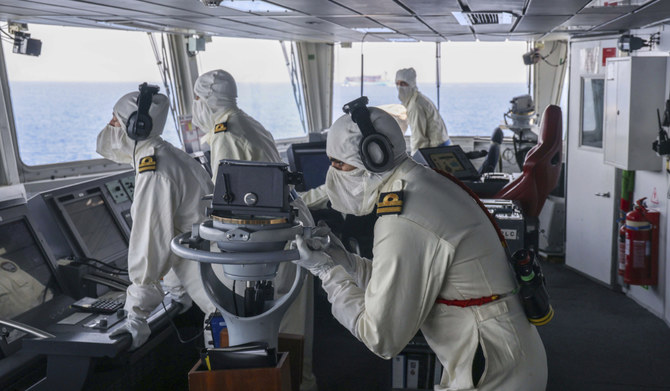
- US military confirmed that the Houthis launched three anti-ship ballistic missiles but caused minor damage to the ship
- A missile landed in the vicinity of a second vessel, the MV Maisha, but it was not damaged, US Centcom said on social media site X
CAIRO/LOS ANGELES: Yemen’s Houthis said on Saturday their missiles hit the Andromeda Star oil tanker in the Red Sea, as they continue attacking commercial ships in the area in a show of support for Palestinians fighting Israel in the Gaza war.
US Central Command confirmed that Iran-backed Houthis launched three anti-ship ballistic missiles into the Red Sea from Yemen causing minor damage to the Andromeda Star.
The ship’s master reported damage to the vessel, British maritime security firm Ambrey said.
A missile landed in the vicinity of a second vessel, the MV Maisha, but it was not damaged, US Central Command said on social media site X.
Houthi spokesman Yahya Sarea said the Panama-flagged Andromeda Star was British owned, but shipping data shows it was recently sold, according to LSEG data and Ambrey.
Its current owner is Seychelles-registered. The tanker is engaged in Russia-linked trade. It was en route from Primorsk, Russia, to Vadinar, India, Ambrey said.
Iran-aligned Houthi militants have launched repeated drone and missile strikes in the Red Sea, Bab Al-Mandab Strait and Gulf of Aden since November, forcing shippers to re-route cargo to longer and more expensive journeys around southern Africa and stoking fears the Israel-Hamas war could spread and destabilize the Middle East.
The attack on the Andromeda Star comes after a brief pause in the Houthis’ campaign that targets ships with ties to Israel, the United States and Britain.
The USS Dwight D. Eisenhower aircraft carrier sailed out of the Red Sea via the Suez Canal on Friday after assisting a US-led coalition to protect commercial shipping.
The Houthis on Friday said they downed an American MQ-9 drone in airspace of Yemen’s Saada province.
Syrian woman is jailed for life over Istanbul killer blast; over 20 others also get prison sentences
Syrian woman is jailed for life over Istanbul killer blast; over 20 others also get prison sentences
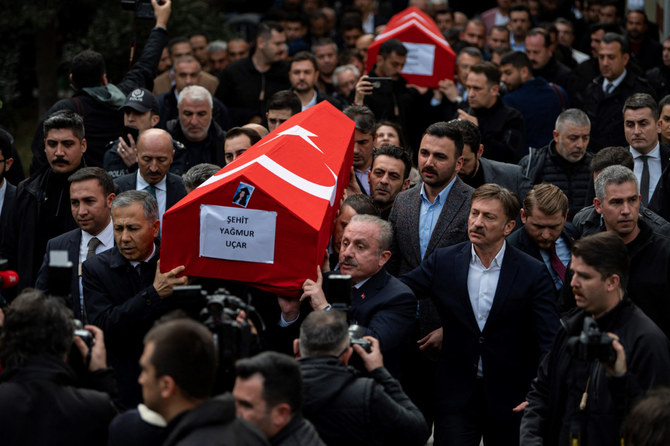
- Ahlam Albashir was given a total of seven life sentences by a Turkish court for carrying out the attack in Istiklal Avenue on Nov. 13, 2022
- Twenty others were given prison sentences ranging from four years to life
JEDDAH: A Syrian woman who planted a bomb that killed six people in Istanbul’s main shopping street 18 months ago was jailed for life on Friday.
Ahlam Albashir was given a total of seven life sentences by a Turkish court for carrying out the attack in Istiklal Avenue on Nov. 13, 2022. Six Turkish citizens, two members each from three families, died in the blast in the busy street packed with shoppers and tourists. About 100 people were injured.
More than 30 other people were accused in connection with the explosion. Four were released from prison on Friday, and a further 10 were ordered to be tried separately in their absence because they could not be found.
Twenty others were given prison sentences ranging from four years to life. Of those, six received aggravated life imprisonment for murder and “disrupting the unity and integrity of the state.”
Turkiye blamed Kurdish militants for the explosion, and said the order for the attack was given in Kobani in northern Syria, where Turkish forces have conducted operations against the Syrian Kurdish YPG militia in recent years.
The YPG and the outlawed PKK Kurdish separatist group, which has fought a decades-old insurgency against the Turkish state, denied involvement in the attack. No group admitted it.
Istanbul has been attacked in the past by Kurdish, Islamist and leftist militants. A wave of bombings and other attacks began nationwide when a ceasefire between Ankara and the PKK broke down in mid-2015.
More than 40,000 people have been killed in the PKK’s conflict with Turkiye since the militant group took up arms in 1984. It is considered a terrorist organisation by Turkiye, the EU and the US.
1 case dismissed, 4 on hold in UN investigation into Oct. 7 allegations against UNRWA staff
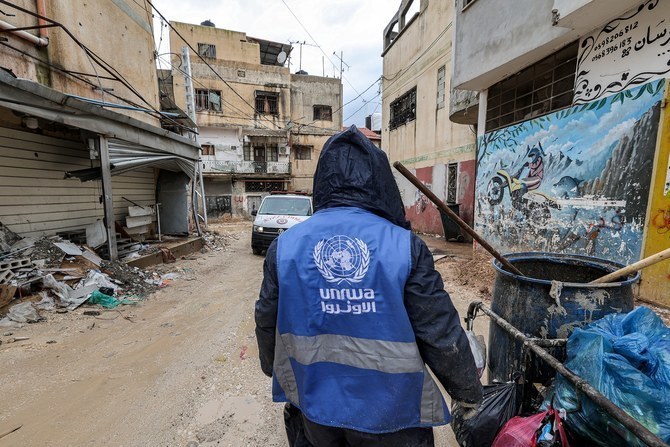
- Investigators have been looking into cases of 12 agency workers accused by Israel in January of participating in attacks by Hamas, and 7 others named later
- 14 cases remain under investigation but the others were dismissed or suspended due to lack of evidence; UN’s internal investigators due to visit Israel again in May
NEW YORK CITY: UN spokesperson Stephane Dujarric said on Friday that the organization’s internal oversight body has been investigating 19 employees of the UN Relief and Works Agency for Palestine Refugees over allegations that they were affiliated with Hamas and other militant groups.
Israeli authorities alleged in January that 12 UNRWA workers participated in the Oct. 7 attacks by Hamas against Israel.
The agency immediately cut ties with the named individuals, and UN Secretary-General Antonio Guterres, in consultation with UNRWA Commissioner General Philippe Lazzarini, ordered an independent review to evaluate the measures taken by the agency to ensure adherence to the principle of neutrality and how it responds to allegations of breaches of neutrality, particularly in the challenging context of the situation in Gaza.
In a wide-ranging report published this week, the investigators, led by Catherine Colonna, a former foreign minister of France, said Israeli authorities have yet to provide any evidence to support the allegations against UNRWA workers. They also noted that Israel had not previously raised concerns about any individuals named on the agency staffing lists it has been receiving since 2011.
They stated in the report: “In the absence of a political solution between Israel and the Palestinians, UNRWA remains pivotal in providing life-saving humanitarian aid and essential social services, particularly in health and education, to Palestinian refugees in Gaza, Jordan, Lebanon, Syria and the West Bank.
“As such, UNRWA is irreplaceable and indispensable to Palestinians’ human and economic development. In addition, many view UNRWA as a humanitarian lifeline.”
Guterres also ordered a separate investigation by the UN’s own Office of Internal Oversight Services to determine the accuracy of the Israeli allegations. The mandate of the OIOS, an independent office within the UN Secretariat, is to assist the secretary-general in the handling of UN resources and staff through the provision of internal audit, investigation, inspection and evaluation services.
Dujarric said the 19 members of UNRWA staff under investigation included the 12 named by the Israeli allegations in January, whose contracts were immediately terminated, and seven others the UN subsequently received information about, five in March and two in April.
Of the 12 employees identified by Israeli authorities in January, eight remain under OIOS investigation, Dujarric said. One case was dismissed for lack of evidence and corrective administrative action is being explored, he added, and three cases were suspended because “the information provided by Israel is not sufficient for OIOS to proceed with an investigation. UNRWA is considering what administrative action to take while they are under investigation.”
Regarding the seven additional cases brought to the attention of the UN, one has been suspended “pending receipt of additional supporting evidence,” Dujarric said.
“The remaining six of those cases are currently under investigation by OIOS. OIOS has informed us that its investigators had traveled to Israel for discussions with the Israeli authorities and will undertake another visit during May.
“These discussions are continuing and have so far been productive and have enabled progress on the investigations.”
The initial allegations against some members of its staff threw the agency, which provides aid and other services to Palestinian refugees in Gaza and across the region, into crisis. The US, the biggest single funder of UNRWA, and several other major donors put their contributions to the organization on hold.
In all, 16 UN member states suspended or paused donations, while others imposed conditions on further contributions, putting the future of the agency in doubt. Many of the countries, including Germany, later said their funding would resume. However, US donations remain on hold.



